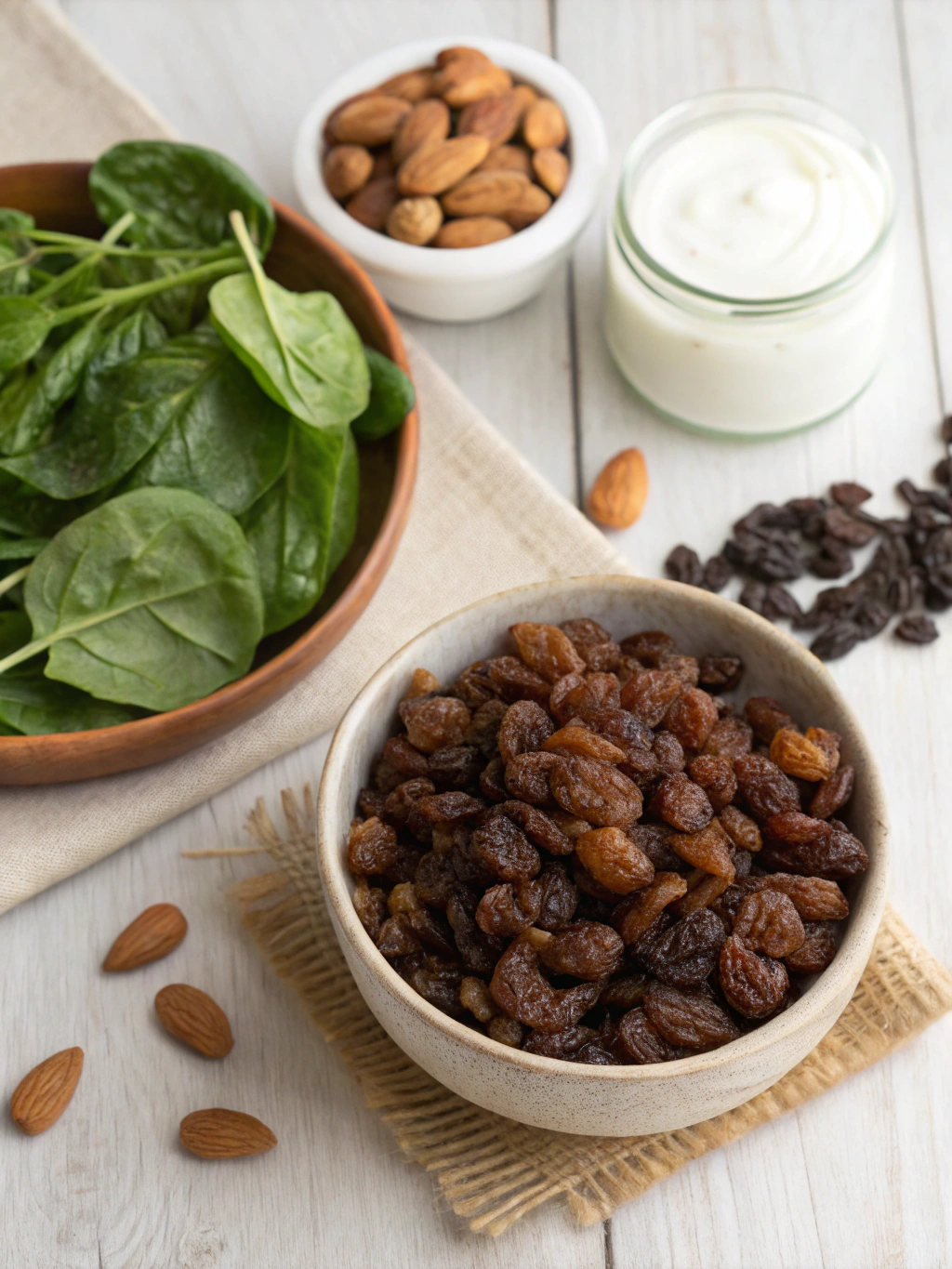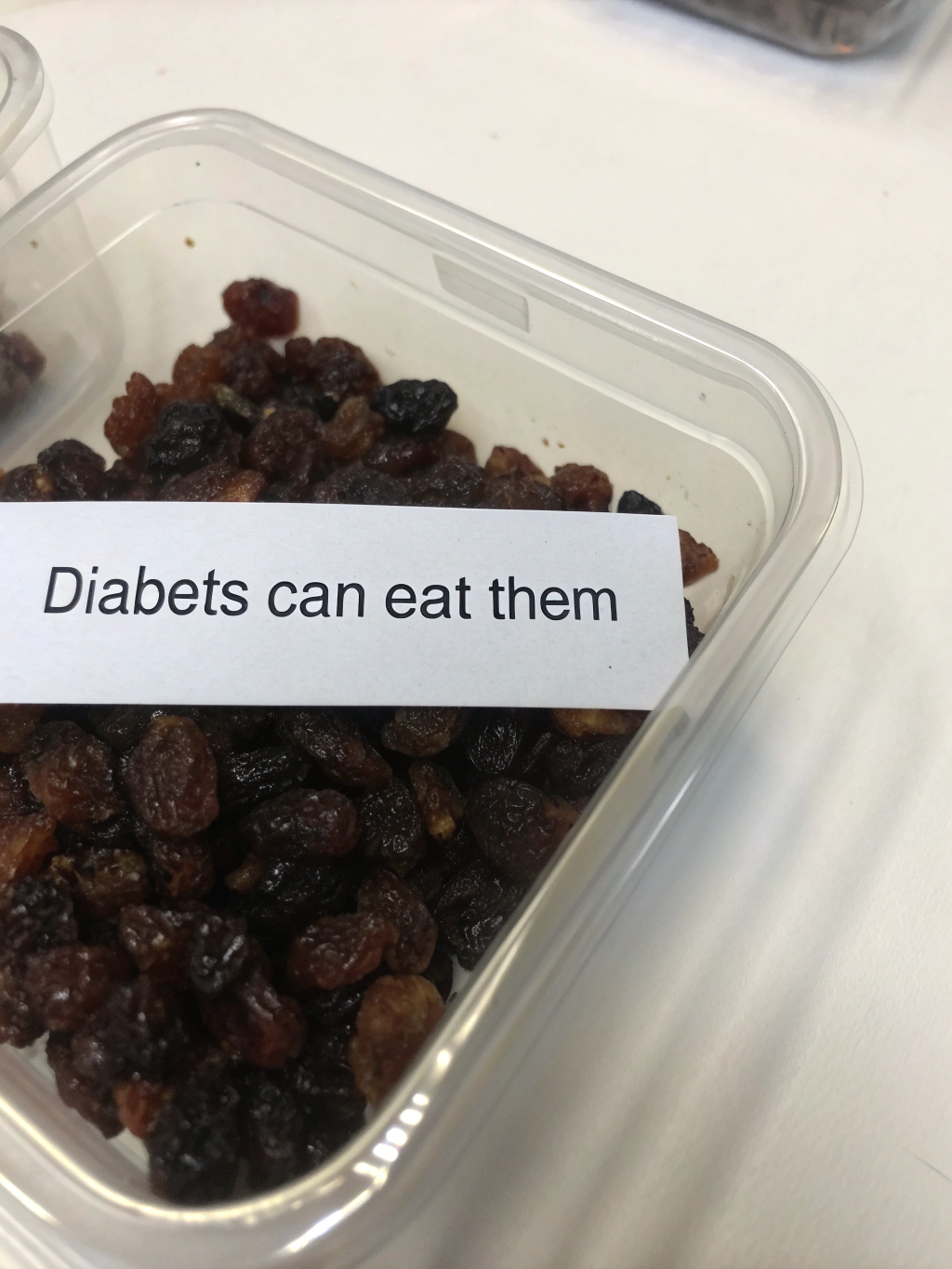Table of Contents
Introduction
Have you ever found yourself standing in the grocery aisle, eyeing those tiny dried grapes and wondering—can diabetics eat raisins? You’re not alone. With over 37 million Americans living with diabetes, this question pops up frequently, especially since raisins have a reputation for being nature’s candy. While conventional wisdom might suggest avoiding all sweet foods, the reality is more nuanced. Research from the Journal of Nutritional Science suggests that dried fruits, including raisins, may actually have some surprising benefits for blood sugar management when consumed appropriately. Let’s unpack the science behind raisins and diabetes to help you make informed dietary choices.
Ingredients List

can diabetics eat raisins
Understanding what’s actually in raisins helps explain their impact on diabetes:
- Natural sugars (primarily fructose and glucose)
- Dietary fiber (approximately 2 grams per 1/4 cup serving)
- Potassium (310mg per 1/4 cup)
- Iron (0.5mg per 1/4 cup)
- Antioxidants (particularly phenolic compounds)
- Zero fat and cholesterol
- No added sugars (in unsweetened varieties)
Substitution options: If concerned about raisins’ impact, consider alternatives like fresh berries, which have lower glycemic impact while providing similar nutrients.
Timing
Understanding when and how to incorporate raisins into a diabetic diet is crucial:
- Optimal consumption time: Mid-morning or as part of a balanced meal (rather than alone on an empty stomach)
- Digestion timeframe: Raisins digest more slowly (40% slower) when paired with protein or healthy fats
- Blood glucose monitoring: Check levels 2 hours after consumption to understand your personal response
- Adaptation period: Allow 3-5 days when introducing raisins to observe how your body responds
Step-by-Step Instructions
Step 1: Determine Your Portion Size
Start small with just 1 tablespoon (about 15 raisins). This contains approximately 7-8 grams of carbohydrates, which is manageable for most diabetics. Research from the American Diabetes Association suggests that portion control is the most critical factor when consuming dried fruits.
Step 2: Pair With Protein or Healthy Fats
Combine your raisins with almonds, Greek yogurt, or cheese. Clinical studies show that consuming carbohydrates alongside protein or fat can reduce blood sugar spikes by up to 30%. This combination slows digestion and provides a more gradual release of sugar into your bloodstream.
Step 3: Track Your Blood Sugar Response
Monitor your blood glucose before eating raisins and again 2 hours afterward. This personalized data is invaluable each person’s response to raisins varies based on individual metabolism, medication, and overall health status.
Step 4: Adjust Based on Your Findings
If your blood sugar remains stable (less than 40 mg/dL increase), you may gradually increase to a maximum of 2 tablespoons per serving. If you notice significant spikes, reduce your portion or try alternative fruits with lower glycemic loads.
Nutritional Information
When considering are raisins good for diabetics, do raisins raise blood sugar, best dried fruits for diabetics, can type 2 diabetics eat raisins, diabetic friendly snacks with raisins, it’s essential to understand their nutritional profile:
- Serving size: 1/4 cup (40g) of raisins contains:
- Calories: 130
- Total carbohydrates: 31g
- Dietary fiber: 2g
- Sugars: 29g
- Glycemic index: 64 (medium)
- Glycemic load: 28 (high when consumed in larger portions)
Data from the International Journal of Food Sciences and Nutrition indicates that despite their sugar content, the particular type of antioxidants in raisins may help improve insulin sensitivity by approximately 10% when consumed regularly in moderate amounts.
Healthier Alternatives for the Recipe
If you’re concerned about raisins’ impact on your blood sugar, consider these diabetes-friendly alternatives:
- Fresh berries (strawberries, blueberries, raspberries) have 70% less sugar and more fiber
- Chopped apple with cinnamon (cinnamon has been shown to improve insulin sensitivity)
- Unsweetened dried cranberries (use sparingly as they’re still concentrated)
- Chopped nuts for crunch and nutrition without the carbohydrates
- Fresh pomegranate arils provide sweetness with additional antioxidant benefits
Serving Suggestions
Incorporate raisins mindfully into your diabetic diet with these balanced serving ideas:
- Sprinkle 1 tablespoon over overnight oats with chia seeds for a slow-release breakfast
- Add to salads with vinaigrette, which research shows can lower the glycemic response by up to 20%
- Mix into Greek yogurt with walnuts for a protein-rich snack that balances blood sugar
- Incorporate into homemade trail mix with almonds and pumpkin seeds (limit to 1/4 cup total mix)
- Use as a natural sweetener in sugar-free baked goods, reducing the overall amount needed
Common Mistakes to Avoid
When incorporating raisins into a diabetic diet, be careful to avoid these pitfalls:
- Consuming raisins alone on an empty stomach (increases blood sugar spike by 35%)
- Overlooking portion size (easy to overconsume due to their small size)
- Choosing yogurt-covered or chocolate-covered varieties (adds unnecessary sugars and fats)
- Ignoring the timing of consumption (evening consumption may affect morning glucose levels)
- Failing to account for raisins in your total carbohydrate count for the day
Storing Tips for the Recipe
Proper storage ensures your raisins remain fresh and nutritionally optimal:
- Store in airtight containers in a cool, dry place for up to 6 months
- Refrigeration can extend shelf life to 1 year while preserving antioxidant content
- Pre-portion into 1-tablespoon servings using small containers or silicone molds
- Freeze raisins for a refreshing texture change that may slow consumption rate
- Monitor for signs of mold or unusual hardening, which indicates it’s time to discard
Conclusion
So, can diabetics eat raisins? The answer is yes with careful attention to portion size, timing, and food pairings. While raisins are concentrated sources of natural sugars, their fiber content, antioxidants, and minerals offer nutritional benefits that shouldn’t be overlooked. The key is moderation and personal monitoring. Rather than eliminating raisins entirely, incorporate them thoughtfully into a balanced diet while tracking your individual response. Remember that managing diabetes is about making informed choices, not eliminating all foods with natural sugars. Try implementing the strategies discussed, monitor your response, and adjust according to your personal health needs. We’d love to hear about your experiences with raisins or other dried fruits in your diabetes management journey!
FAQs
Do raisins cause blood sugar spikes in all diabetics?
No, individual responses vary significantly. Research from the Diabetes Care journal indicates that about 60% of people with Type 2 diabetes can tolerate small portions of raisins without significant spikes, especially when consumed with protein or fiber.
How many raisins can a diabetic safely eat per day?
Most diabetes educators recommend limiting intake to 1-2 tablespoons (15-30 raisins) per day, which provides approximately 7-15 grams of carbohydrates. This should be included in your daily carbohydrate counting.
Are golden raisins better for diabetics than regular raisins?
Nutritionally, they’re nearly identical. The difference in color comes from processing (sulfur dioxide treatment for golden raisins), not sugar content. Choose based on personal preference.
Can eating raisins actually improve blood sugar control?
Some research suggests that the specific antioxidants in raisins may improve insulin sensitivity when consumed regularly in appropriate portions. A 12-week study showed modest improvements in fasting glucose levels in participants consuming 1 ounce of raisins daily compared to processed snacks.
What’s the best time of day for diabetics to eat raisins?
Mid-morning or after exercise when your body can more efficiently process carbohydrates. Avoid eating them on an empty stomach or right before bedtime when insulin sensitivity may be lower.
Did you try our recipe ?
There are no reviews yet. Be the first one to write one.

